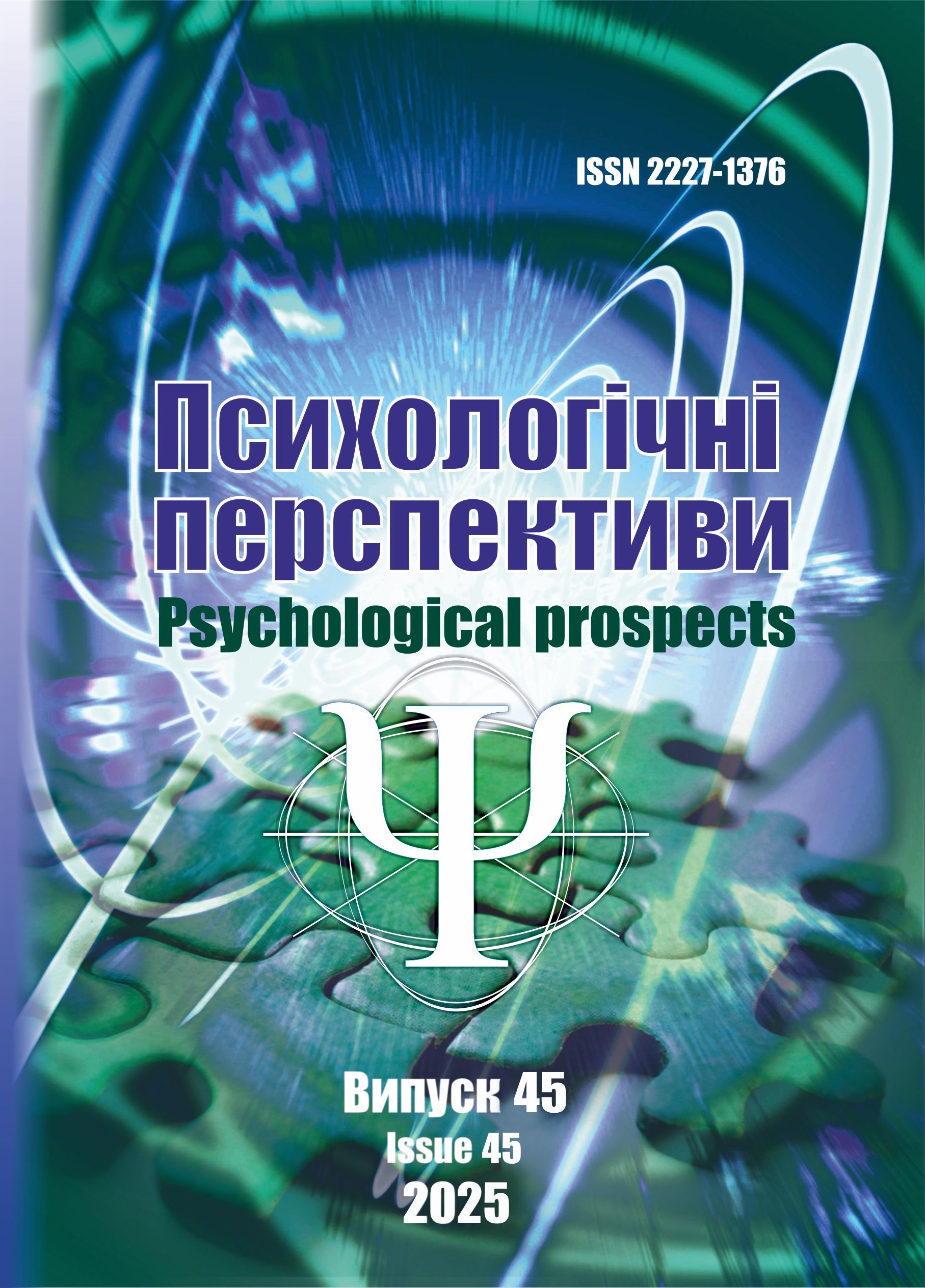Traumatic Events as Factors of the Depression Development in Young People
DOI:
https://doi.org/10.29038/2227-1376-2025-45-kryKeywords:
trauma, affective disorders, social isolation, student youthAbstract
Purpose. This article presents a comprehensive study of the relationship between experienced traumatic events, depressive symptoms, and the subjective feeling of loneliness among young individuals. The research examines the hypothesis that psychologically traumatic events play a significant role in the development of affective disorders and social isolation during adolescence — a critical stage of emotional and psychological development.
Methods. The empirical analysis employed validated psychodiagnostic tools: the Liebowitz Social Anxiety Scale (LSAS), which assessed the level of fear and discomfort in social interactions; the UCLA Loneliness Scale (Russell, Peplau, & Ferguson), which measured the degree of emotional isolation and lack of social support; and the Depression Anxiety Stress Scales (DASS-21; Lovibond & Lovibond), which provided a quantitative assessment of negative emotional states.
Results. The results confirmed a statistically significant correlation between the intensity of traumatic experience, the severity of depressive symptoms, and the depth of perceived loneliness. Based on the data, typical psychological profiles of young individuals at increased risk for affective disorders were identified. It was found that even a single traumatic episode may lead to impairments in emotional regulation and a decline in social functioning.
Conclusions. The article emphasizes the importance of early psychological screening, professional support, and the development of preventive interventions for youth who have experienced psychological trauma, in order to prevent the chronicity of emotional disorders and the deepening of social isolation.
References
1. American Psychiatric Association. (2013). Diagnostic and statistical manual of mental disorders (5th ed.). Arlington, VA: American Psychiatric Publishing. DOI: https://doi.org/10.1176/appi.books.9780890425596
2. Bisson, J. I., Roberts, N. P., Andrew, M., Cooper, R., & Lewis, C. (2013). Psychological therapies for chronic post-traumatic stress disorder (PTSD) in adults. Cochrane Database of Systematic Reviews, (12), CD003388. https://doi.org/10.1002/14651858.CD003388.pub4 DOI: https://doi.org/10.1002/14651858.CD003388.pub4
3. Heim, C., Newport, D. J., Mletzko, T., Miller, A. H., & Nemeroff, C. B. (2008). The link between childhood trauma and depression: Insights from HPA axis studies in humans. Psychoneuroendocrinology, 33(6), 693–710. https://doi.org/10.1016/j.psyneuen.2008.03.008 DOI: https://doi.org/10.1016/j.psyneuen.2008.03.008
4. Hua, C., Yao, X. , Piatt, J.A. (2025). Depression alleviation among survivors of traumatic events through travel and recreation participation. Tourism Review. https://doi.org/10.1108/TR-10-2024-0953 DOI: https://doi.org/10.1108/TR-10-2024-0953
5. Jiang, C. (2021). Unpacking the Associations between Traumatic Events and Depression among Chinese Elderly: Two Dimensions of Aging Attitudes as Mediators and Moderators. International Journal of Mental Health Promotion, 23(2), 231–242. https://doi.org/10.32604/IJMHP.2021.015253 DOI: https://doi.org/10.32604/IJMHP.2021.015253
6. Kessler, R. C., Berglund, P., Demler, O., Jin, R., Merikangas, K. R., & Walters, E. E. (2005). Lifetime prevalence and age-of-onset distributions of DSM-IV disorders in the National Comorbidity Survey Replication. Archives of General Psychiatry, 62(6), 593–602. https://doi.org/10.1001/archpsyc.62.6.593 DOI: https://doi.org/10.1001/archpsyc.62.6.593
7. Kuyken, W., Warren, F., Taylor, R. S., Whalley, B., Crane, C., Bondolfi, G., Hayes, R., Huijbers, M., Ma, H., Schweizer, S., Segal, Z., Speckens, A., & Teasdale, J. D. (2015). Efficacy of mindfulness-based cognitive therapy in prevention of depressive relapse: An individual patient data meta-analysis from randomized trials. JAMA Psychiatry, 73(6), 565–574. https://doi.org/10.1001/jamapsychiatry.2016.0076 DOI: https://doi.org/10.1001/jamapsychiatry.2016.0076
8. Long, K. T., Galatzer-Levy, I. R., & Bonanno, G. A. (2025). Trajectories of depression predict patterns of resilience following loss and potentially traumatic events. Journal of traumatic stress, https://doi.org/10.1002/jts.23140 DOI: https://doi.org/10.1002/jts.23140
9. Marqueses, J. M. S., Sanz, J., García-Vera, M. P., Morán, N., & Eisma, M. C. (2023). Posttraumatic Stress Disorder, Anxiety, and Depression Symptoms After Potentially Traumatic Events: Latent Classes and Cognitive Correlates. The Journal of nervous and mental disease, 211(2), 141–149. https://doi.org/10.1097/NMD.0000000000001580 DOI: https://doi.org/10.1097/NMD.0000000000001580
10. McLaughlin, K. A., Green, J. G., Gruber, M. J., Sampson, N. A., & Kessler, R. C. (2010). Childhood adversities and adult psychopathology in the WHO World Mental Health Surveys. The British Journal of Psychiatry, 197(5), 378–385. https://doi.org/10.1192/bjp.bp.110.080499 DOI: https://doi.org/10.1192/bjp.bp.110.080499
11. Nemeroff, C. B. (2016). Paradise lost: The neurobiological and clinical consequences of child abuse and neglect. Neuron, 89(5), 892–909. https://doi.org/10.1016/j.neuron.2016.01.019 DOI: https://doi.org/10.1016/j.neuron.2016.01.019
12. Nolen-Hoeksema, S., Wisco, B. E., & Lyubomirsky, S. (2008). Rethinking rumination. Perspectives on Psychological Science, 3(5), 400–424. https://doi.org/10.1111/j.1745-6924.2008.00088.x DOI: https://doi.org/10.1111/j.1745-6924.2008.00088.x
13. Paus, T., Keshavan, M., & Giedd, J. N. (2008). Why do many psychiatric disorders emerge during adolescence? Nature Reviews Neuroscience, 9(12), 947–957. https://doi.org/10.1038/nrn2513 DOI: https://doi.org/10.1038/nrn2513
14. Piirtola, M., Haravuori, H., Kiviruusu, O., Viertiö, S., Suvisaari, J., Marttunen, M., Kaprio, J., Korhonen, T. (2025). Traumatic life events as predictors for depression in middle-aged men and women: A Finnish twin study. Journal of Affective Disorders, 370, 470-480. https://doi.org/10.1016/j.jad.2024.11.011 DOI: https://doi.org/10.1016/j.jad.2024.11.011
15. Southwick, S. M., Bonanno, G. A., Masten, A. S., Panter-Brick, C., & Yehuda, R. (2014). Resilience definitions, theory, and challenges: Interdisciplinary perspectives. European Journal of Psychotraumatology, 5(1), 25338. https://doi.org/10.3402/ejpt.v5.25338 DOI: https://doi.org/10.3402/ejpt.v5.25338
Downloads
Published
Issue
Section
License
Copyright (c) 2025 Zoreslava Kryzhanovska, Nataliia Kordunova, Vladyslav Mariukha

This work is licensed under a Creative Commons Attribution-NonCommercial 4.0 International License.






